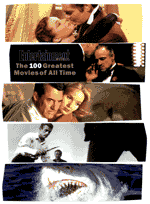|
 Entertainment
Weekly's 100
Greatest Movies of All Time, a hardcover guide published in
1999 by Time-Life Inc. and written by senior editor Ty Burr, celebrated
films that can't be forgotten, that "help us understand and define
who we are." Entertainment
Weekly's 100
Greatest Movies of All Time, a hardcover guide published in
1999 by Time-Life Inc. and written by senior editor Ty Burr, celebrated
films that can't be forgotten, that "help us understand and define
who we are."
See also Entertainment Weekly's 2013 updated 100
All-Time Greatest Films.
Facts and Commentary About the List:
- The final list was whittled down from a preliminary collection
of 500 nominated choices, excluding short films, documentaries, or any
movies from the previous five years (from 1994 onward).
- The final 100 choices deliberately
corrected the American Film Institute's most glaring omissions - Preston
Sturges, Buster Keaton, and Ernst Lubitsch, and added some of the best
foreign films - from Fellini, Truffaut, and Kurosawa.
- An additional 25 more films were listed below the major
list, and were included in the book's appendix in alphabetical order.
Supposedly, they were "just too beloved to ignore."
- The compilers claimed that the compilation ought to prompt you to
build your own personal top 100, 200, 500... "This is a parlor game
that prompts memory and appreciation, nudges us toward a shared set
of creative benchmarks, and perhaps most important, can be passed on
to the moviegoing neophyte with the words, 'Start here.'"
- According
to the book's introduction, the most represented male star was James
Stewart (with five films); Cary Grant, Robert De Niro and Alec Guinness
had four films each, and Janet Leigh had three films.
- The most represented
director was Alfred Hitchcock (with four films), and there were three
films each from Michael Curtiz, David Lean, Martin Scorsese, Steven
Spielberg, and Billy Wilder.
Note: The films that are marked with a yellow
star  are
the films are
the films
that "The Greatest Films" site has selected as the "100
Greatest Films".
|

![]()